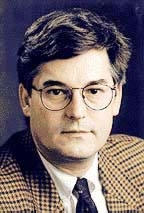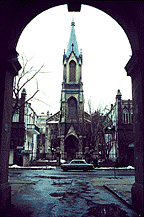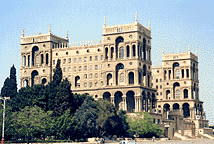|
Spring 1995 (3.2) Diplomatic Interview Michael Schmunk, Chargés d'Affaires Interview by Svetlana Turyalay
I arrived in Baku in November 1994. For the previous four years, I had been working in South Africa. Baku makes a strong first impression on foreigners with its variety of architecture and great number of music and cultural institutions. There's an oriental section in the town with the old architectural monuments such as the Maiden Tower and the Palace of the Shirvanshah, and there's a more European section that grew rapidly during the Oil Boom at the turn of the century. Private commercial business is beginning to develop. It doesn't take long to realize there is great economic potential here. Is this what you expected? Last summer when I was sitting
in my office in Pretoria, a representative of the German Ministry
of Foreign Affairs from Bonn called to ask if I would consider
heading up the German Embassy in Baku. The call came so unexpectedly.
Azerbaijan? I had to think where it was on the map. All I could
imagine was some country far away on the shores of the Caspian,
rich in oil. I had no other knowledge except that it was a former
Republic of the Soviet Union and that it had enjoyed its own
independence for a very short period (1918-1920) prior to Soviet
rule. Are you aware that in the 19th century, after Germany's war with Napoleon, hundreds of Germans migrated here to Azerbaijan in an attempt to escape hunger and starvation? I never expected to find any traces of Germany in Azerbaijan. There's the town of Khanlar which even went by the German name, Helenendorf, in the 19th century. Even today you can find people of German descent. I've visited wine factories built by German colonists and discovered that between the towns of Helenendorf and Kedabek, Germans used to be involved in copper mining. Few people realize that Baku at one time even had a German mayor, Nikolaus von der Nonne. Back at the turn of the century in the section of Baku known as "Black City" (because of its proximity to the oil fields), there used to be a German Consulate headed by Otto Tiedemann. And over on the "28th of May Street", the German "Kirche" (church) still stands with its easily recognizable German-style architecture. Of course, prisoners of war have left their mark on this city as they were forced to build what has turned out to be many of the finest buildings of that period. For example, the Government Building which houses most of the Ministries was built between 1945-49 by German prisoners. Today, we are interested in reviving the memory of everything that is connected with our German ancestry here. What spheres do you see Germany and Azerbaijan collaborating in?
Are you satisfied with the state of economic relations between Germany and Azerbaijan? We're still at an early stage. I'm often asked why Germany, which is such a highly developed industrialized country, is so sparsely represented here. But Azerbaijan still needs to create the economic and legislative prerequisites to attract foreign investment. For example, foreign companies need to be able to acquire land to build new enterprises. Taxes must be more amenable. Privatization must be carried throughout the country. The flow of currency must be facilitated. So the number of foreign investments directly relates to the willingness of Azerbaijan's government to carry out reforms. Is Germany involved with any of the European Community (EC) projects here? In 1993-94 we allocated 2.3 million Deutsche Marks for various training programs and we'll be increasing that figure to DM 3 million this year. Much of the money goes for providing Azerbaijan with legal advisers and counselors to carry out reforms. And then we've designated 5 million marks as assistance with refugees. Since Germany is economically one of the strongest members of the European community, we pay for 20% of all EC programs in Azerbaijan. How is it that you've been so active with the Azerbaijan refugees? Germany is quite sensitive to the plight of refugees. Since the end of World War II up until 1989, we knew what it meant to be separated as a nation and we have suffered from our own share of refugee problems. That's why we understand how much the refugees want to go back to their own land in Nagorno-Karabakh and the surrounding areas. It is necessary to try to find a resolution for both sides of this conflict. What is Germany's position on Nagorno-Karabakh? We support the activities of
the OSCE (Organization for Security and Cooperation in Europe)
and are actively involved with the Minsk Group, the committee
within the OSCE which has been given the responsibility of dealing
with the Karabakh problem. Unfortunately, continuation of this
conflict blocks the harmonious development of both Azerbaijan
and Armenia. We support Azerbaijan's right to maintain its sovereign
borders. We are convinced that the Armenians should withdraw
their army from Nagorno-Karabakh and other land they are currently
occupying (20% of Azerbaijan's territory). We believe Azerbaijan
should give Armenians greater autonomy in the region. But that
doesn't mean Karabakh should become an autonomous country of
its own. What kinds of relations does Germany have with Azerbaijan in the sphere of education and culture? We provide a number of scholarships
for Azerbaijani students and scholars. Baku and Mainz as well
as Sumgayit and Ludwigshafen are "Sister Cities". At
the end of last year, we held a "German Culture Week"
in Azerbaijan. In the future, we want to arrange for the exchange
of artists and musicians. Do you think your assignment in Azerbaijan will prove beneficial to your career as a diplomat? Definitely. There's no doubt
about it. Actually, living here enables me not only to experience
the transition process of Azerbaijan in its early stages of independence,
but it gives me a chance to take part as a diplomat. We've been
going through a similar process in Germany for some time now.
Back
to Index AI 3.2 (Summer 1995) |



